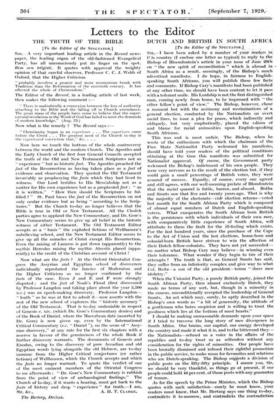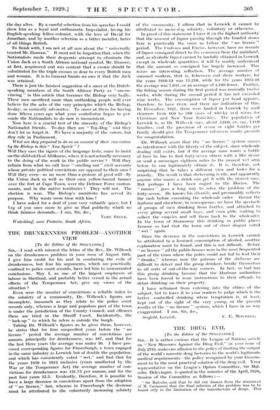DUTCH AND BRITISH IN SOUTH AFRICA
[To the Editor of the SPECTATOR.] SIR,—I have been asked by a number of your readcrs in tl is country (I enclose one letter as typical) to reply to the Bishop of Bloemfontein's article in your issue of June 29th on "the new spirit of reconciliation" which is abroad in South Africa as a result, seemingly, , of the Bishop's much advertised manifesto. I do hope, in fairness to English-. speaking South Africans, you will publish these few facts and comments. If Bishop Cary's manifesto had been published at any other time, we should have been content to let it pass with a tolerant smile. His Lordship is not the first distinguished man, coming newly from home; to be impressed with " the other fellow's point of view." The Bishop, hoirever, chose a moment hot with the acrimony and recriminations of a general election, conducted by the Nationalists on overt racial lines, to issue a plea for peace, which indirectly and obliquely, but very emphatically, placed the cdium of and blame for racial animosities upon English-speaking South Africans.
This was and is most unfair. The Bishop, when he wrote of the enthusiasm with which the chairman of the Free State Nationalist Party welcomed his manifesto, should have told your readers of the political conditioni obtaining at the time this manifesto was submitted for Nationalist approval. Of course, the Government party welcomed the Bishop's indictment of his own peoOle. They were very nervous as to the result of the election but, if they could gain a small percentage of British votes, they were assured of success. Equally, of course, every one, agreed and still agrees, with our well-meaning prelate of Blomfontein that the racial quarrel is futile, barren, and absurd. Botha and Smuts saw that five and twenty years ago. That is why the majority of the electorate—vide election returns—voted last month for the South African Party which is coniposed of almost equal numbers of Dutch and English-speaking voters. What exasperates the South African born British is the persistence with which individuals of their own race, with comparatively little experience of South Africa, will attribute to them the fault for the ill-feeling which exists. For the last hundred years, since the purchase of the Cape to the Act of Union and the last elections, home-born -and colonial-born British have striven to win the affection of their Dutch fellow-colonists. They have not yet succeeded— no matter what Bishop Cary may believe—in winning even their tolerance. What wonder if they begin to tire of their attempts ? The truth is that, as General Smuts has said, they suffer from an inferiority complex and give way to what Col. Reitz—a son of the old president—terms " sheer race idolatry."
When the Unionist Party, a purely British party, joined the South African Party, then 'almost exclusively Dutch, they made no terms of any sort, but, though in a minority` in the caucus, unconditionally accepted the leadership of General Smuts. An act which may, surely, be aptly described in the Bishop's own words as " a bit of generosity, the attitude of a gentleman who hates suspicion and is willing to trust the goodness which lies at the bottom of most hearts."
I should be making unreasonable demands upon your space if I tried to traverse the long story of race divergence in South Africa. Our brains, our capital, our energy developed the country and made it what it is, and to the bitterend they— the Nationalists—refused us a voice in the affairs of the republics and to-day treat us as uitlanders without any consideration for the rights of minorities. Our people have been brutally dismissed and refused their rightful promotion in the public service, to make room for faVourites and relations who are Dutch-speaking. The Bishop suggests a division of public posts on the fifty-fifty principle. I assure you, Sir, we should be very thankful, as things go at present, if our people could hold 40 per cent. of those posts with any guarantee of tenure.
As for the speech by the Prime Minister, which the Bishop quotes with such satisfaction—surely he must know, your readers must know, that Mr. Hertzog says one thing to-day, contradicts- it to-morrow, and contradicts the contradiction
the day after. By a careful selection from his speeches I could show him as a loyal and enthusiastic Imperialist, loVing his English-speaking fellow-colonist, with the love of David for Jonathan; and by another selection as a bitter racialist, hater of all things British.
To finish with, I am not at all sure about the " universally trusted Mr. Duncan." It must not be forgotten that, when the Nationalists made their desperate attempt to eliminate the Union Jack as a South Afrieari national symbol, Mr. Duncan, at first, acquiesced and was content that a crown should be substituted for the triple crosses so dear to every British man and woman. It is to General Smuts we owe it that the Jack was retained.
There is just the faintest suggestion of a sneer at the Dutch- speaking members of the South African Party as uncon- vincing " in this article that becomes the Bishop very bfidly. These mien sacrificed more than unthinking people will ever believe for the sake of the very principles which the Bishop, to-day, so earnestly advocates. To sneer at them for having done fifteen years ago what your contributor hopes to per- suade the Nationalists to do now is inconsistent.
Now here is a crucial test of the sincerity of the Bishop's Nationalist friends. To-day they are " Top-Dog and they don't let us forget it. We have a majority of the voters, but they rule in Parliament.
What are they prepared to do as an earnest of their conversion by the Bishop to this New Spirit" ?
Will they ease the rigour of the language tests, cease to insist on the shibboleth of Afrikaans, where it is not actually necessary to the doing of the work in the public service ? Will they refrain from what we call here " smelling out " civil servants whose private political convictions are opposed to their own ? Will they even—as no more than a gesture of gocd will—fly the Union Jack as well as their own yellow-barred banner over the fort at Cape Town, over the Defence Force canton- ments, and in the native territories ? They will not. The election is won. The Bishop's manifesto has served its purpose. Why waste more time with him ?
I have asked for a deal of your very valuable space, birt I beg of you once more to give us that publicity which we think fairness demands.—I am, Sir, &e., Waterkloof, near Pretoria, South Africa.
VERB STENT.

































 Previous page
Previous page